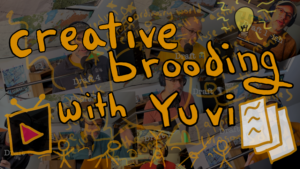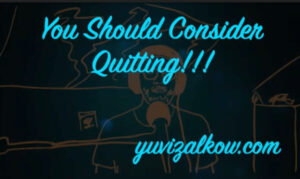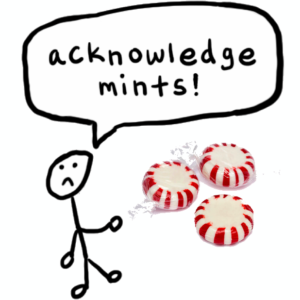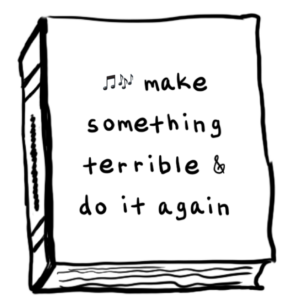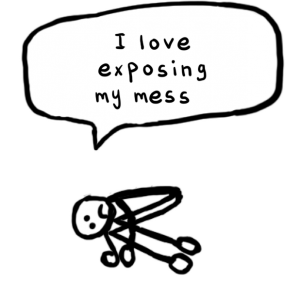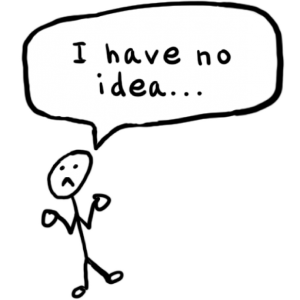Posts by Yuvi Zalkow
Even though I wrote and published two novels and some short stories over the past fifteen years, I’ve actually been trying to finish a different novel for almost two decades. At this point, I think I’m finally getting close to the finish line. Though, after 17 years and who knows how many drafts, it’s hard to know if I’ll ever be done with it.
Before I get to the actual point of this post, I need to explain a few other things going on in my life right now. I’ve been helping my parents as they deal with some mental and physical issues. I’m also raising a teenage kid who brings home all kinds of new fads and phrases that I’m awkwardly trying to keep up with. I’m also becoming one of the older people at my day job in the tech industry as I step into the mid-50s of my life.
With all this stuff going on, I’ve been thinking a lot about age, and aging, and what sort of attitude I’d like to have as I grow older, and as I try to (maybe possibly hopefully please for the love of…!@#$!@#%) get to the finish line of this multi-decade novel manuscript.
Ideally, I want to capture some of the energy and passion I had as a younger writer. And some of the wisdom and experience of an older writer. But I also want to avoid the arrogance I’ve ocassionally seen in both younger and older writers. Like the way, when I was younger, I spent all that time dreaming of fame and fortune, or the way, as I grow older, I occassionally act like I’ve got it all figured out.
A phrase that comes to mind as I process all this is when someone says, “I’m too old for this shit!” I hear it sometimes as a complaint, or sometimes as a way to show off about seniority. I’m not saying that this phrase shouldn’t ever be used (sometimes it’s a genuinely funny line to say), but it’s just that I don’t want to complain (or show off) about where I’m at. I know that age is sometimes a factor in a decision, but either way, I want to consider the situation, and then decide how to proceed.
Anyway, I put together a video back in October where I think about the novel that I’m writing alongside my thoughts about aging. (You’ll have to forgive the dated-ness of one small reference to the “forthcoming” election.)
Click HERE to view on YouTube.
How about you? What elements do you want to capture (or avoid) about a younger or older writer?
Read MoreAround 14 years ago I posted my first video (on Vimeo at first, and then I stumbled my way onto YouTube a few years later). I did it out of cowardice. I was getting my Masters at Antioch University and I needed to lead a 50-minute lecture. I was so terrified of public speaking that I recorded a 20-minute PowerPoint presentation to kill some time during the lecture. The video was about my obsessive short story submission process, navigating the slush piles (which were mostly physical piles of papers back then). While recording it, I was so worried it would be boring that I told a few jokes about my insecurities, through my recorded words and through visual gimmicks on the screen. The presentation went well, people liked the insights, laughed at the jokes, and I even had fun with the Q&A afterward. I graduated, but more importantly, I learned that I loved making these silly videos.
I’ve been making videos ever since. Always experimenting with different low-budget low-skill ways of adding humor to these videos. I’ve taken some detours to talk about health issues, chronic pain, gaming, and other weird things, but mostly I’ve circled around the creative process, especially writing.
Therese kindly reached out to me back in 2011 and I’ve posted many of the videos on the fabulous Writer Unboxed.
Anyway, to celebrate these 14 years, I thought I’d share with you 14 of my favorite videos about writing. Some of these made their way onto WU. Others not. Feel free to join me on this awkward ride and pick a few videos to watch. I’ve broken them into a few categories:
The Creative Mindset
Lately I’ve focused on the creative mindset a little bit more than the specifics of the process. Though after scanning my videos, I see that I’ve been fascinated by the mindset for many years. Here are four examples across the years.
1. Most People Don’t Give a Shit About Your Thing • June 29, 2022 • 5 minutes
2. Taking Risks • January 21, 2014 • 6 minutes
3. Bathing in the I-Don’t-Know-ness • December 13, 2020 • 6 minutes
4. To Hell With Your Productivity Tips • October 20, 2022 • 5 minutes
The Writing Process
From the start, I was always trying to nail down a realistic process to help me get my writing done. Here are four approaches I took to discussing the process.
5. Writing a Novel When You’re Too Busy to Write a Novel • February 1, 2020 • 5 minutes
6. Non-Crappy Writing Groups • January 23, 2012 • 5 minutes
7. Writing Through Pain • June 26, 2018 • 4 minutes
8. Fresh Ways to Look at Your Crappy Writing • November 24, 2011 • 5 minutes
Writing Tools
Although I’ve spent a lot less time focusing on writing tools, I’m still a little bit fascinated with the best way to use my digital tools effectively. Also, I ❤️️ Scrivener.
9. Why Scrivener? • September 18, 2015 • 7 minutes
10. How I Use Tech to Write • February 13, 2019 • 3.5 minutes
Book Releases
I published two novels in my time of making YouTube videos. […]
Read MoreMy book came out about four months ago, and I’m just finishing up with book-related events. Over the past year, I spent A LOT of time thinking about these events, partly because I’m an angst-ridden ball of craziness, but also because I wanted to make these events fun!
I remember going to a few stuffy, uninspiring bookstore events in the past (even for books and for authors that I love), and I really didn’t want my events to be boring. I hate to actually come off optimistic-sounding (!!!), but these are exciting times for writers doing events at bookstores. I don’t know if it’s because of the pandemic or because of other changes in the air, but I found that booksellers were open (and even encouraging) about shaking up the format (even if, for me, it required bringing in awkward A/V equipment to the smaller bookstores).
Now I’m not saying that we writers should overshadow the celebration of the writing itself—that is still the main event—but I just think there are many cool ways you can make the event fun and uniquely YOU. One common option is to have a conversation with someone you find interesting. I liked bringing on folks who I wanted to speak with, and we chose themes that were near and dear to both of us. For instance, in my most recent event, I had a conversation with Brian Benson. He writes amazing personal essays about his childhood and has a particularly beautiful way to write about his own vulnerability. Even though I write books that are usually about (mostly fictional) adults, vulnerability plays a big part in my stories too. And so we talked through how we get to those places.
Then there are options to use various props at these events. If you know me at all, you might not be surprised to hear that I incorporated animated videos (with stick figure drawings) into my bookstore events. Some of my friends brought musical instruments on stage, or even a band, or a collection of Pez dispensers, or invited someone who appeared in their memoir. Whatever or whoever you bring on stage, I think it’s important to relate it to themes in your writing, but that still leaves a lot of possibilities.
I don’t mean to suggest that every writer needs to bring on other people and other props, but I just wanted to mention these options if you don’t have another format that you feel strongly about.
Regardless of how the event is structured, one element that I think is always valuable is to get comfortable(ish) speaking to an audience. I have terrible stage fright (when I step out from the safety of my attic) and so I got help from an online workshop called Ultraspeaking. They really helped me get out of my head and learn how to actually enjoy having an unscripted conversation with the audience. (By the way, they are NOT paying me to say this! I just really liked those folks…) I don’t think a public speaking workshop is required, but it is worth practicing for these events, and understanding that this is a performance, in addition to a […]
Read MoreAs I dig back into writing another novel, and as I wonder (again) if I can pull off this project that I’ve been trying to complete for… a long time, I wanted to document what I think it takes to write a decent novel. I’m not specifically talking about the craft of writing a novel (even though that’s plenty important), but more about the general traits that allow me to complete any big crazy project like a novel.
I came up with three specific things that are necessary (for me) to write and complete a book.
For good or for bad, these are fuzzy things, definitely not in the realm of WRITE 7.25 MILLION WORDS A DAY! or WRITE EVERY DAY AT 4:15AM! or FOLLOW THE HERO’S JOURNEY PERFECTLY OR ELSE!
Rather than spoil it, I’ll let the video speak for itself, because I think it works better if you see how I approached this exercise, rather than list those items here.
If you were to come up with your own fuzzy secrets (or skills or traits or qualities or whatever!) to write and finish a book, what would be on your list?
Read MoreWait! Before you get offended and stop reading, let me explain! 😜 As you’ll see in the video, I don’t mean this message as depressingly as it initially sounds. And I’m not necessarily even talk to YOU about the message. It’s more that I want to share the mindset I’ve been using as I’ve gone out there with my latest novel.
First, let me back up. When my first novel came out (10 years ago!), I got really bummed about all kinds of big and small things related to the (lack of) attention the book got. Also, my attempts to market the book did not go particularly well. It didn’t help that there were some issues with the publisher and other things going on outside of my control, but still, I was disappointed by a lot of things around that timeframe. It honestly took a few years for my creative life to recover from these feelings.
This time, I decided to think about the book (and everything I share or create or present in the same timeframe) as something that I’m doing without any expectation of people caring. If people care, that’s totally fabulous, and I’ll savor those moments. But when I create a video or publish an essay or even share a dumb tweet about the writing process — I make sure that it is something that nourishes me to create, and is something that I’m happy to share, even if nobody is on the other end saying, YES! 👍! LIKE! ❤️️! GO YUVI!….
It’s a mindset shift. It doesn’t mean I try any less hard. And it’s not a statement about people’s apathy. Think of it like a second-rate, neurotic version of some Buddhist ideas related to unmet expectations and the problems with a “wanting mind”…
After the credits roll for the video, I do add a short little epilogue about the importance of a community (like WU! ❤️), because I didn’t want my message to diminish how I value a community. But enough of my caveats, let’s get to the video!…
Do you fall victim to unmet expectations and disappointment in your creative life? How do you manage these feelings?
Read MoreI signed my book deal with Red Hen Press over two years ago, before COVID times if you can even remember those days! It comes out on June 7th and I’m in the freak-out-and-get-ready phase right now. The process of working with this indie press has been very positive and I’d be happy to chat about it sometime. (Do I recommend Red Hen Press for other authors? Yes!)
But the funny thing is that, while having this good experience with a small press, I’ve also been thinking a lot about the gatekeepers involved in getting a thing out there into the world. I’m using the term “gatekeepers” loosely because in some cases these gatekeepers are more in my head than in real life. But there are quite a few folks involved in the process of getting my book out the door. There is my agent, there is my publisher, there’s a publicity person, a media person, and the list goes on. I’m honored to work with these people, but it’s a lot of voices (on top of the voices in my head). There’s another element of the process around anticipating reviews from the big reviewers like Kirkus Reviews or Publisher’s Weekly. What if they love it? What if they hate it? (So far the news is good, but…) There are just a lot of steps and a lot of rules between finishing the book and sharing the book with the world.
All this to say that it takes a lot of mental space for me to manage this process and I continually re-assess whether I’m going through each step because I believe in it, or because others want me to do it. I think I’m going down a road that I believe in, but some days it feels… complicated. I have a tendency to want to please people and I have to keep that people-pleaser voice in check.
And that’s why I’m particularly giddy about how many avenues we creative people have at our disposal to get stuff out there on our own terms without any gatekeepers stopping us or assessing us. We can self-publish stories and essays and books, we can pump out YouTube videos, we can make a podcast, or TikTok our way to fame, or blog about all the bloggy things we’ve ever dreamed of blogging about.
There are many difficult aspects about what we’re facing right now as I sit here in the middle of 2022, worrying about the many things to worry about. But one amazing aspect about right now is how many ways we can share our cool creations with an audience.
ANYWAY, this little video is just me savoring this opportunity we have to get our creative stuff out in the world on our own schedule and on our own terms, even if we also embrace (and even celebrate) some traditional methods at the same time.
How do y’all think about traditional publishing vs. self-publishing? Big press vs. small press? New platforms vs. old platforms? Where do you see yourself most happy along this landscape?
Read MoreSo my video today is different than previous videos. For one, it is FORTY MINUTES LONG!!@#$!@#!! But also, it’s not something that all of y’all will necessarily want to ride along with me on. For that reason, I want to talk about why I made the video regardless of whether you sacrifice a chunk of your day for my obsessive video about some dude in some video game.
Ever since I read The Writer’s Journey by Christopher Vogler twenty years ago (and then explored the ideas of Joseph Campbell who inspired this book), I’ve been fascinated with the hero’s journey and how it works (or doesn’t work) in my favorite stories. I can no longer watch a movie or read a book without assessing that story for the qualities of this storytelling structure. And when I’m writing my novels, I often think about the hero’s journey, at least after the first draft. (I usually ignore it for the first draft so that I can focus on getting to know the voice, unencumbered by any structure.) To be honest, I’ve probably created my own variant of how this journey works since it has rummaged around in my head for so many years.
One of my favorite phases in this journey is The Reward (aka “Seizing the Sword”). This is the spot in the story where the hero comes back from a big conflict (The Ordeal) with some treasure. In my stories (and in many stories), this treasure isn’t exactly a physical treasure, but just some wisdom or insight or lesson. And after they get this reward, the hero can prove what they’ve learned in a subsequent conflict (The Resurrection). I love when this happens in a story, like when we get to see how Luke Skywalker decides—to hell with this fancy targeting system on my spaceship, I’ll just use what I learned about the force to blow up the Death Star! (Oops. Did I just spoil that movie for someone?! I figure if you haven’t seen it in the past 45 years, I’m allowed to spoil it a little bit…) So, when I’m working on a draft of one of my stories and I’m not getting the desired response from other readers, I look through my story to see if I’ve overlooked any of these storytelling steps.
I don’t treat this structure as the only way to tell a story and I don’t stick to this structure too rigidly, but it is one useful tool I like to use when I realize that my early drafts suck, which they always do. 😜
Alongside this fascination with the hero’s journey, I have become a gamer in the past few years. In particular, I love games that have a well-written narrative. And I recently stumbled onto a game called Red Dead Redemption 2 (which came out in 2018). Among other great qualities, this game has a remarkable story arc for the hero (Arthur Morgan). After clocking in too many hours with this game, I realized that I felt emotions for Arthur Morgan like no other video game hero I’d encountered. So I wanted to analyze the main narrative for the qualities of the hero’s journey. […]
Read MoreI used to think that it was enough to just call it “draft 3” and dig in without much planning. But something I realized along the way is that it works way better for me if I’m explicit about the purpose of each draft, of each pass through each project I’m working on. This is particularly important for book-sized projects, but I also like this approach for shorter writing projects, and for my videos, and really anything else that requires multiple passes to complete. The purpose is sometimes vague, like for a first draft, it might be: “what the hell is this thing about?” But for some of the middle drafts, it can be very specific: “Nail down the POV for Kitty” or “Fix that crappy dialogue” or “Follow through with that pocket watch I introduce in Chapter 1.” When I discover issues unrelated to the current purpose, I add it to a running list and get back to the current agenda. Though I’m honestly not as strict about this as it might sound—sometimes I cheat a little, especially for small issues. Sometimes, the new issue is big enough or impactful enough that I need to readjust the whole plan. But it still helps me (and keeps me less freaked out!) to have an explicit purpose for each round.
ANYWAY, here is my video explanation of this idea (which involved many boring wardrobe changes)…
What about y’all? Do you have a specific plan for each draft of your writing? Or do you keep it looser and more flexible than this?
Read MoreSorry about that title… I didn’t mean it to sound confrontational. It’s really just my internal monologue. Because I consider quitting. I consider quitting all the time. Every day. This applies both to my specific writing projects, and also to writing in general. And with all my other creative endeavors. But I don’t mean to say that I give up on everything. I just consider it. Because, for me, it really is worth pondering whether each crazy venture is worth it. I even considered quitting this video a few times…
Do you think about quitting? Do those thoughts reflect a weakness, or an important part of your creative process?
Read MoreSo the last time I posted a video on Writer Unboxed, I talked up bathing in the unknown. And it got me thinking, even if the unknown is a powerful place, what’s next? For me, after some bathing, I like to figure out what I’ve got on my hands. (Yeah, I know, the bathing metaphor just fell apart…) And the most effective way I know to make it more known… is by seeing how it affects other people. These people need to be trusted people, especially at this early phase, because the material is raw and messy and I’m probably feeling vulnerable. Even so, seeing (or more like: feeling) another person’s response is critical for me to take the story to the next phase.
Look, I know plenty of writers who don’t require others to create something powerful. But not me, I need to listen for when the reader (or listener) laughs or sighs or gasps or holds their breath. And then, I can better understand what the hell I’m writing. That’s when I find out that my story I thought was about all the crazy bus routes in Portland is really about one lonely man’s longing to connect with another person. Or how my Darth Vader story is really a story about the challenges of step parenting. Or how there are already enough think pieces about Bojack Horseman. (OK, just kidding about that last one. Don’t get me wrong, I’m a sucker for think pieces about Bojack, but I haven’t actually written one myself yet… The other examples are actually true.)
My whole process is really just a back and forth between time alone with my writing and time learning how others respond to the writing. But this first step from the unknown to the… slightly-more-known is my favorite phase (even if it’s also the scariest).
Here’s the video I made about this subject:
What about you? Do you have trusted readers who help you along the writing journey? Are you comfortable exposing your mess?
I’m just one year shy of being 50 years old and I’ve been thinking a lot about a conversation I had with a coworker when I was in my early 20s. It wasn’t really a conversation as much as it was this man (about 20 years older than me) telling me how people my age didn’t know a damn thing and how when you got older (older like him), you’d finally know what was what. I remember how proud of himself he was. How much he enjoyed telling me this information. On my commute home, I remember thinking how his stance didn’t sit right with me. I mean, not just the monologuing part, but also I questioned whether it sounded appealing to really know what was what.
And now that I’m older (older than that guy at the time), it still doesn’t sit right.
I mean, I know that some things only come with experience. Some things only come from years of hard work. It is satisfying to know more things. But at the same time, I don’t want to totally know what is what. I often love to bathe in the I-don’t-know-ness, especially in the early phase of a creative project. I still want to stumble around in the dark and discover new things. At some point, I suppose, it’s fine to understand what you’re up to. But I’d argue that some of the best discoveries happen because you don’t know exactly where you’re going.
I’m not saying that I always want to fumble around in a dark cave. I’m all for outlining or planning or whatever tools are necessary to reign in the madness of creating something. And I definitely appreciate getting something to the finish line. But I still want to allow room to venture into the unknown, even if I occasionally set up some guardrails, or breadcrumbs, or whatever second-rate metaphor you’d like to use to get yourself back home…
But don’t trust blogger me, listen to YouTuber me:
What do you think? What is your comfort for the unknown?
Read MoreI’ve always struggled with being monogamous when it comes to my creative projects. Sometimes this comes at the cost of not finishing one project or another. (I have hundreds of unfinished stories hiding in multiple digital clouds.) And my creative projects go far beyond writing. I like to make mobile apps. I used to do a podcast. I just started making neurotic music. And if you’ve seen me loitering around Writer Unboxed, you know I also like to make YouTube videos (warning: new video incoming!).
For a long time, I elevated the writing as the one reputable activity. The others were just cute little pastimes. But recently, while struggling with chronic pain, sleep issues, and now, with all that is going on around the world (and specifically in the United States!), I’ve come to a new perspective on how I view my creative projects. All these creative projects have value. When I can, I work on whichever creative project is best suited to this moment, taking into account my state of mind, my mood, my state of health, the amount of time I’ve got—whatever feels right. It is OK to listen to the ebb and flow of whatever is ebbing and whatever is flowing.
If I want to write an essay about what’s going on in the world, great. If I want to make a song about headaches, no problem. If I want to make a video about the writing struggle, cool. If I want to write a short story about some silly thing that doesn’t even try to tackle the bigness of what is happening outside my door, there’s no shame in that either.
What’s funny about this acceptance is that I’ve been able to be more productive with this new mindset. (Not that “productivity” is the main goal here.) I feel more free, more open, less conflicted, less guilty.
I know not everyone wants to work on multiple creative projects at the same time. But I wonder for those of you out there who have other creative outlets, what is your relationship to these outlets? Do you consider one outlet more important than another?
Oh. Yeah. I almost forgot about the video I made about this whole subject. I think it characterizes my perspective better than these words—a video felt like a more natural way for me to tell this story. So here it is:
I made this video before the brutal murder of George Floyd and the protests, but as I write this post, I’ve started to realize how much more I need to understand and engage with what is going on around racism. I’m familiar with bigotry against Jews, but I have a lot to learn about racism against Blacks. I know that there are so many places to start, but I’ve started by reading some books by Ibram X. Kendi (both on my own and with my family). I’m also donating both time and money to organizations that fight racism, and I’m writing letters to local leaders who can make changes. I know this video and blog post are not about racism, but I still wanted to share my clumsy-but-sincere efforts to learn and engage.
Read More
